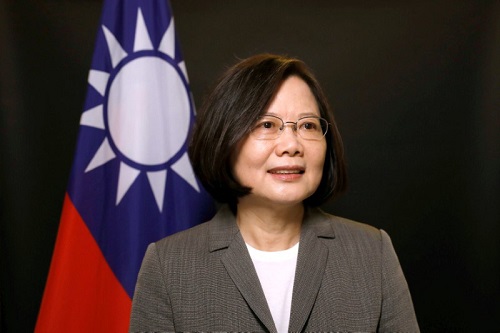Tyrone Siu/Reuters
By
J.R. Wu
Taiwan President Tsai Ing-wen is signalling she needs more give and take from China to rein in hardliners on an island China considers its own, officials say, but Beijing is unlikely to budge months before its five-yearly Communist Party Congress.
As she marks one year in office on Saturday, Tsai, leader of the ruling independence-leaning Democratic Progressive Party (DPP), is facing a surge in anti-China sentiment amid pressure from Beijing on the proudly democratic island to bow to its “one China” policy.
It is becoming more difficult to hold the line against independence-minded constituents and even tougher for Tsai to offer concessions to Beijing, one senior government official told Reuters on the condition of anonymity.
“President Tsai’s attitude is that she is very determined to maintain the status quo of democracy and cross-Strait relations,” the official said, referring to the body of water separating the two sides.
“She hopes China can respond in a positive manner so she can also respond in a positive manner and narrow the distance with China.”
China has claimed Taiwan as its own since defeated Nationalists fled to the island in 1949 after losing a civil war with the Communists. Only a handful of countries recognise Taiwan as a country, making it ineligible, for instance, for membership of UN organisations.
In recent weeks, Tsai has given a series of interviews after a half-year break and taken to Twitter to talk about Taiwan being shut out of a UN health meeting and made her first extensive comments on the detention of a Taiwan activist in China.
This is all an effort to give Beijing a roadmap on where “goodwill” can be extended and in turn give her a chance to reciprocate, said Taiwan sources, on the condition of anonymity due to the sensitivity of the matter.
FEARS OF A “COLLISION”
At least 70 percent of Taiwanese do not accept the “one China” policy, with 58.4 percent blaming Beijing as being the more provocative of the two since Tsai took office on May 20 last year, according to a poll by the Cross-Strait Policy Association, which is comprised of prominent academics and bipartisan figures.
“My concern right now is that on some level of cross-Strait relations, a collision is about to begin,” said Fan Shih-ping, an association member and a political science professor at National Taiwan Normal University.
Fan said he would not have predicted this development a year ago, but now, pointing to social media and online conversations in Taiwan and in China, there was a growing sense of “mutual disgust”.
A spokesman for China’s Taiwan Affairs Office said last week everything wrong with the current relations could be blamed on the DPP and its refusal to accept “one China”.
“No matter what new flowery language the DPP comes up with, it can’t shift its responsibility for this reality,” spokesman An Fengshan said.
Taiwan minority opposition party lawmaker Freddy Lim recently decried Beijing for pressuring Taiwan to recognise “one China” if it wanted to attend the World Health Organisation’s annual meeting in Geneva next week. He said China was forcing Taiwan to “castrate” itself.
Cross-strait academics in Taipei have also been spooked by the detention of Taiwanese rights activist Li Ming-che, who travelled to China for medical consultations in March only to disappear.
It was 10 days before Beijing confirmed Li had been detained for security reasons, but so far it has not disclosed Li’s whereabouts and last month cancelled his wife’s visa to stop her from going to China to look for him.
GROWING POLARISATION
Tsai has said both sides should look for a “new model” for ties but has not defined it, a senior DPP official said, mainly to show Beijing she is open to ideas.
“I hope Chairman Xi Jinping, as a leader of a large country and who sees himself as a leader, can show a pattern and flexibility, use a different angle to look at cross-Strait relations, and allow the future of cross-Strait ties to have a different kind of pattern,” Tsai told Reuters in an interview last month.
China’s biggest fear is that Tsai does something rash, like call an independence referendum, said a Beijing-based Western diplomat. That would give the hardliners in the Chinese military an upper hand for a forceful response, he added.
China has never ruled out the use of force to bring Taiwan under its control.
Tsai and the DPP understand that before China’s party congress in the autumn, Chinese President Xi won’t be able to offer breakthroughs in ties even if he wanted to, Taiwan sources say.
“What we can see is that ahead of the 19th party congress, the Taiwan issue will be caught up in the power struggle of the top echelon of China’s Communists,” Fan said.
One foreign representative based in Taipei said the party congress and how ties develop between China and the United States, Taiwan’s most important political ally, were variables Tsai could not control.
“She’s got to map out all the pressure points and try to mitigate them,” he said.
Thomson Reuters Foundation, the charitable arm of Thomson Reuters, that covers humanitarian news, women’s rights, trafficking, property rights and climate change.



No Comments Yet!
You can be first to comment this post!